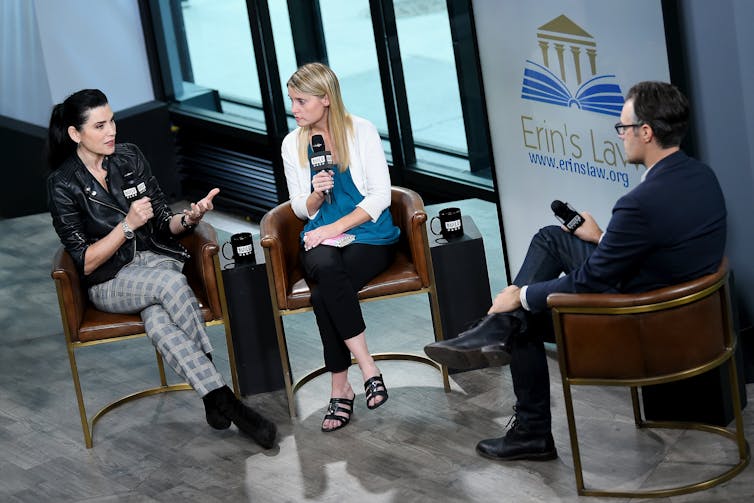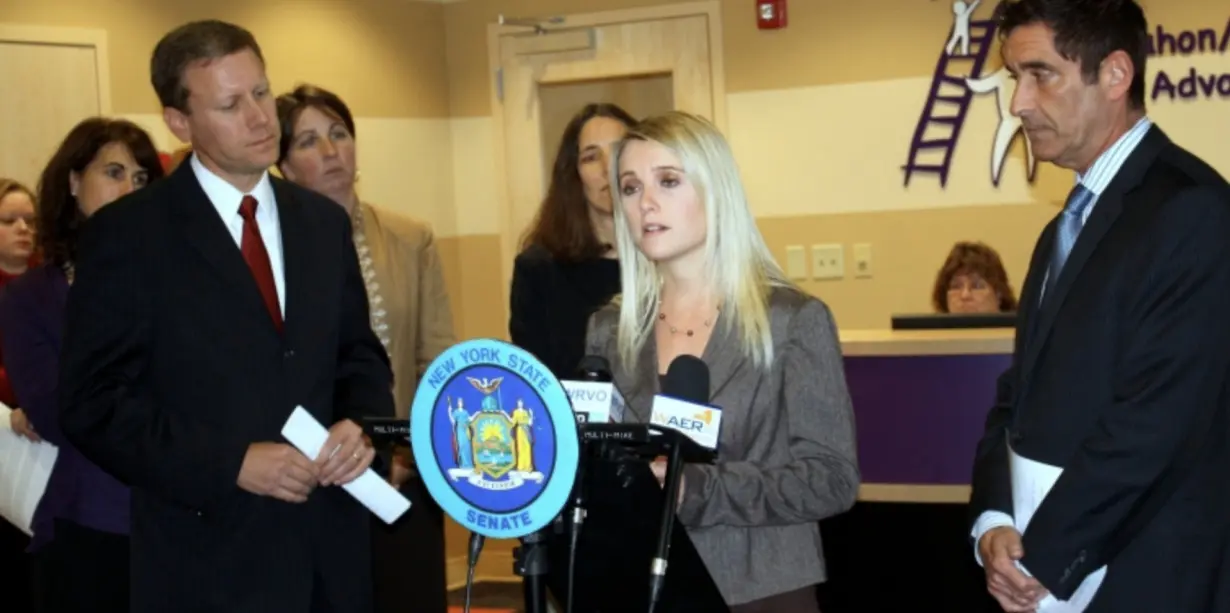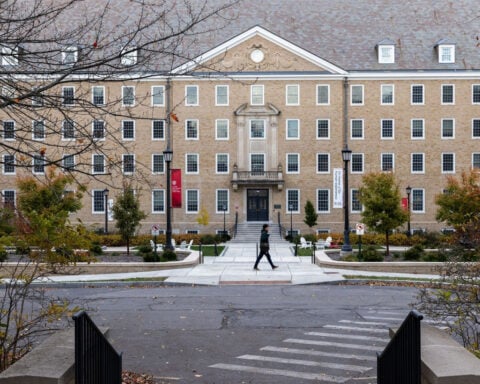Policymaking, a process by which governments make decisions about how to address social issues, is shaped by various factors, such as the political climate, socioeconomic conditions and cultural and historical backgrounds.
Some factors are obvious, others not. Often, policy is made by groups of people working together – advocates, regular citizens, lobbyists, lawmakers.
Less often, there’s a single person who emerges as the key figure in making new policy.
One of those people is Erin Merryn, a mother and social worker originally from the Chicago suburbs who endured abuse as a child. Her efforts as an adult ultimately resulted in 38 states passing legislation named Erin’s Law that aims to prevent child abuse through education of children in schools.
As scholars who study how public policy is made and implemented, we sought to answer questions raised by the adoption of this new policy, in light of the advocacy of one woman. Why did some states adopt Erin’s Law but not others? How do different state legislatures respond to interactions with what public policy scholars call a “policy entrepreneur” like Erin Merryn?
Laws were reactive
Erin’s Law, by and large, requires the teaching of prevention classes on child sexual abuse and exploitation to students in kindergarten through eighth grade, as the New York state law, for example, now mandates.
Child abuse in the United States became a major public concern after the publication of “The Battered-Child Syndrome” in 1962. The book significantly raised social awareness of child abuse and highlighted the crucial roles that social workers, physicians and educators play in identifying and protecting children at risk.
However, meaningful state-level actions to address the problem were limited until Erin’s Law was enacted. Prior to Erin’s Law, much of the legislative response was limited to mandatory reporting of child abuse after it had occurred, which did little to prevent or detect abuse.
Erin’s Law was different – it aimed to prevent abuse before it starts through education, which is a proactive approach, rather than a reactive approach that focuses on abuse that has likely already happened.
In explaining how policies are adopted by government, political scientist John W. Kingdon emphasized the pivotal role of policy entrepreneurs like Merryn in pushing for a solution or drawing attention to specific policy problems. Kingdon wrote in 1984 that policy entrepreneurs are “advocates who are willing to invest their resources — time, energy, reputation, money — to promote a position in return for anticipated future gain in the form of material, purposive or solidary benefits.”
Policy entrepreneurs act as catalysts for making new policy by introducing new ideas, attracting media attention, building networks with legislators and providing them with essential information and perspectives. They persist in their efforts, even in the face of initial opposition.
Erin’s journey
As detailed in her book, “An Unimaginable Act” published in 2013, Merryn was sexually abused when she was 6 years old and suffered through continued abuse until her teens. This horrific experience encouraged Merryn to become a social worker.
After getting a master’s degree in social work, writing multiple books about her experiences and dedicating years to social work, Merryn felt compelled to seek broader and systemic change through nationwide legislation.
She left her job as a social worker and began touring state legislatures and engaging in advocating publicly for policy changes across the U.S. From 2011 to 2018, Merryn visited 36 states and spoke in legislatures a total of 111 times.
The first state in which Merryn tried to get the new policy adopted was her home state of Illinois, where she teamed up with a Republican state lawmaker, Sen. Tim Bivins. After four months of extensive research, they completed the initial draft of Erin’s Law.
In November 2010, Merryn was invited to the Illinois State Capitol, where she delivered short testimony on the need for the law. Her testimony led the way for the policy to be adopted, and on Feb. 14, 2011, Gov. Pat Quinn signed Erin’s Law into effect.
Normally, policies are adopted when state legislators come together in regular sessions and debate in committees about the policy. With a deluge of information provided by their staff, lobbyists or their constituents – often all three – capturing state lawmakers’ attention can be extremely hard for members of the public. However, Merryn was able to gain lawmakers’ attention and consideration by employing a powerful story and passion — and, of course, with some luck.
Typically, Merryn’s visits came after her outreach to legislators via emails explaining Erin’s Law. This was often followed by lawmakers’ invitation to her to testify before legislative committees.
These invitations to testify, though, were sparked in other ways, too.
Merryn’s testimony in Michigan emerged from a conversation with a senator’s aide at a family wedding. In New York, when Erin’s Law stalled in the Legislature, a phone call from actress Julianna Margulies to Mayor Mike Bloomberg led to Merryn getting time with state lawmakers. We believe that Bloomberg’s support provided Merryn with the policy allure needed to capture the attention of state lawmakers. And in Pennsylvania, her testimony came at a time when the Legislature was reeling from the Jerry Sandusky scandal, in which a longtime Penn State assistant coach was accused of, and found guilty of, sexual abuse of children.
Merryn faced multiple roadblocks along the way, but her perseverance played an important role in the widespread adoption of Erin’s Law. Her recognition as the 2012 Glamour magazine “Woman of the Year” further boosted her visibility and impact as she continued the advocacy.

Policy entrepreneurs get results
In our research, we have found that state legislatures frequently visited by policy entrepreneurs are more likely to adopt the new policy and do so more quickly compared to those with fewer or no visits from such individuals.
Merryn’s visits, interactions and speaking engagements not only furnished legislatures and legislators with new information but also reframed the issue in a more politically palatable manner. Erin’s Law was presented as a protective, preventive and empowering approach for children, rather than a reactive one.
The influence of policy entrepreneurs relies on how well the issue they are advocating for aligns with the political landscape of the state. Merryn’s advocacy had a greater chance of helping legislation get passed in liberal states than conservative ones. In liberal states, more funds are spent on education, health and public safety, and preventing children’s victimization is a policy priority.
Where there is alignment between policy entrepreneurs and legislators, they forge a symbiotic relationship, mutually aiding each other in achieving their goals. Policy adoption for policy entrepreneurs and likely gains in popularity for legislators can translate into electoral gains.
A policy entrepreneur’s success at getting a policy adopted by the legislature depends on the nature of the problem being addressed. Erin’s Law was more promptly adopted in states grappling with severe child abuse problems, demonstrated by increased incidents, reports and investigations.
It also was more promptly adopted in states with more female legislators. Women in legislatures are known to stress more heavily what are often seen as “women’s issues,” including children’s and families’ needs, domestic violence and social welfare.
In those states where Erin’s Law has not yet been enacted, ongoing efforts to pass the legislation, including media engagement, lobbying, petitions and testimonies, are often led by Erin Merryn herself, along with legislators and child protection organizations.

The authors do not work for, consult, own shares in or receive funding from any company or organization that would benefit from this article, and have disclosed no relevant affiliations beyond their academic appointment.
Source: The Conversation

 China's CATL to seek Hong Kong listing
China's CATL to seek Hong Kong listing
 Holiday shoppers increased spending by 3.8% despite higher prices
Holiday shoppers increased spending by 3.8% despite higher prices
 Dollar edges up on bets of US growth, inflation
Dollar edges up on bets of US growth, inflation
 Russia declares federal emergency over Black Sea oil spill
Russia declares federal emergency over Black Sea oil spill
 Israeli military loosened rules of engagement at start of Gaza war, New York Times reports
Israeli military loosened rules of engagement at start of Gaza war, New York Times reports
 US sex-abuse watchdog fires investigator after learning of his arrest for stealing drug money
US sex-abuse watchdog fires investigator after learning of his arrest for stealing drug money
 Hwang Dong-hyuk on killing off his 'Squid Game' characters and wanting to work with Jake Gyllenhaal
Hwang Dong-hyuk on killing off his 'Squid Game' characters and wanting to work with Jake Gyllenhaal
 Erling Haaland misses penalty and Man City drops more points after 1-1 draw with Everton
Erling Haaland misses penalty and Man City drops more points after 1-1 draw with Everton
 Erin Merryn, center, flanked by Senators David J. Valesky, left, and Jeffrey D. Klein, at the New York state senate discussing Erin's Law in October 2011.
Erin Merryn, center, flanked by Senators David J. Valesky, left, and Jeffrey D. Klein, at the New York state senate discussing Erin's Law in October 2011.







